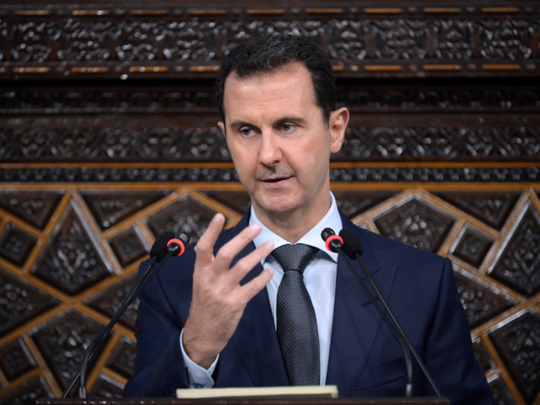
It is a sign of wisdom that the United States State Department possesses a “dissent channel”, allowing diplomats to voice their reservations about official policy. And it’s evidence of profound unease when a “dissenting cable” over Syria should attract no less than 51 signatures, the biggest number since this method of licensed opposition was established after the Vietnam war. The tragedy is that the essential argument of the maverick Syria cable, which was leaked last Thursday, is utterly convincing.
In brief, the dissident diplomats point out some inescapable truths. The Syrian President, Bashar Al Assad, reinforced by Russian air power and Iranian ground forces, believes that he is safe from being overthrown. With the military balance tipped in his favour, he sees no need to negotiate with his enemies, hence the utter failure of the various recent peace talks in Geneva.
Instead of a negotiated settlement, Al Assad is now bidding for total military victory. Only last week, he publicly vowed to reconquer “every inch” of the 70 per cent of Syria that has slipped from his grasp into a multitude of hands. For all the bravado, however, his threadbare armed forces, exhausted by five years of war, lack the manpower for such an ambitious task. So Al Assad will not achieve total victory — and nor will he negotiate seriously — meaning that the war will drag on indefinitely, with all that entails in terms of sheer human suffering, not to mention refugee flows to Europe and the threat of terrorism.
The only answer is to compel Al Assad to reach a settlement by tipping the military balance against him. Hence the US diplomats urge the “judicious” use of force against the Syrian regime, stressing that this is the only way to revive the peace talks. After all, if Al Assad thinks he is safe, then he has no reason to reach a settlement. Leaving aside the diplomatic case for action, the cable stresses the “evident and unquestionable” moral rationale for “taking steps to end the deaths and suffering in Syria”. The authors of this plea from the coalface of American diplomacy are right.
The real target
The tragedy is that US President Barack Obama is clearly in no mood to listen. His policy on Syria is to stay out and avoid any use of American firepower, save against the terrorists of Daesh (the self-proclaimed Islamic State of Iraq and the Levant).
After clinging doggedly to that line for the last five years of war, he is not going to change his mind during his final six months in office. The real target of the dissenting cable is probably Hillary Clinton, who has already signalled how she would toughen US policy towards Syria if she wins the presidency. But the dissident diplomats have also exposed — perhaps unwittingly — the incoherence of Russia’s military adventure in Syria. After this expedition began on September 30 last year, Russian President Vladimir Putin set out two goals: To create a political “process” leading to a peaceful Syria and to hammer Daesh.
What has happened? The peace talks have collapsed and Al Assad will tell anyone who listens that his policy is military victory, not a negotiated settlement.
Meanwhile, Russia has only bombed Daesh insofar as this helps Al Assad — which means that it has never treated the terrorist movement as a priority target. On the contrary, Putin’s bombs have generally fallen on every rebel movement except Daesh; the latest to suffer Russian air strikes were the non-Islamist insurgents of southern Syria who might, incidentally, be a vital barrier against a Daesh advance.
And all along, Al Assad’s wanton brutality against Syria’s largely Sunni population has served as the main incubator of Daesh. If Russia wants to promote peace and defeat Daesh, then strengthening Al Assad runs directly counter to both objectives. For now, Syria is trapped in the most destructive vortex of all. Its dictator will not negotiate and cannot achieve outright victory. His biggest ally insists on backing him to the hilt whatever he does, even if this destroys any chance of peace. Meanwhile, the only country with the power to break the stalemate persists in staying its hand, no matter what horrors result from a conflagration that rages on and on. In six months’ time, let us hope that a President Clinton dusts off the dissenting cable and acts on its advice.
— The Telegraph Group Limited, London, 2016
David Blair is the Chief Foreign Correspondent for the Daily Telegraph.








